Politics
North Korea carries out launch of two new missiles
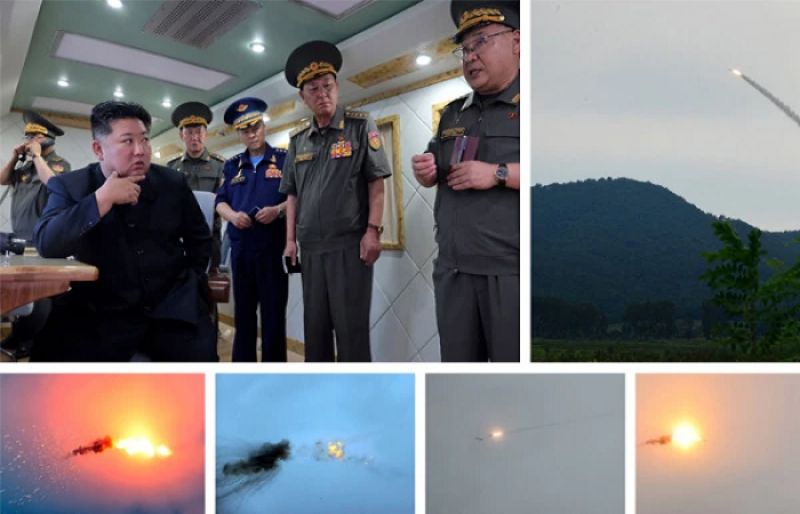

North Korean leader Kim Jong Un personally supervised the test-firing of two newly developed air defence missiles, state media reported Sunday, shortly after Pyongyang accused Seoul of stoking tensions along the border.
According to the Korean Central News Agency (KCNA), the launches, conducted on Saturday, demonstrated that the two “enhanced” missile systems possessed “superior combat capability.”
The agency did not provide specific details about the missiles or the test site, only noting that their “operation and reaction mode is based on unique and special technology.” KCNA added that the firing confirmed the projectiles were highly effective in targeting and destroying a range of aerial threats.
Photos released by state media showed missiles streaking into the sky and what appeared to be the interception of incoming targets.
Other images showed Kim receiving a briefing from military officials, with binoculars placed beside him on his desk.
The report also said Kim assigned an “important task” to the country’s defence science sector ahead of a key ruling party meeting.
Meanwhile, South Korea’s military said it fired warning shots on Saturday after several North Korean soldiers briefly crossed the heavily fortified border earlier in the week.
According to UN Command, about 30 North Korean troops crossed the boundary line on Tuesday, Yonhap news agency reported.
Pyongyang’s state media later quoted Army Lieutenant General Ko Jong Chol, who labelled the incident a “premeditated and deliberate provocation.”
“This is a very serious prelude that would inevitably drive the situation in the southern border area where a huge number of forces are stationing in confrontation with each other to the uncontrollable phase,” Ko said.
Ukraine lesson
Analysts say Pyongyang appears to be accelerating the development of air defence missiles aimed at countering drones, citing the KCNA report that specifically mentioned “drones and cruise missiles”.
“The North is bolstering air defence missiles against low-altitude flying drones and cruise missiles,” said Hong Min, a senior analyst at the Korea Institute for National Unification.
The development of such air defence missiles attests to “Pyongyang’s recognition of the necessity to enhance its capabilities based on lessons it learned” fighting in Russia’s war against Ukraine, he added.
South Korean and Western intelligence agencies have said the North sent over 10,000 soldiers to Russia in 2024 primarily to the Kursk region along with artillery shells, missiles and long-range rocket systems.
Around 600 North Korean soldiers have been killed and thousands more wounded fighting for Russia, Seoul has said.
New South Korean President Lee Jae Myung has sought warmer ties with the nuclear-armed North and vowed to build “military trust”, but Pyongyang has said it has no interest in improving relations with Seoul.
Politics
Trump accepts Nobel medal from Venezuelan opposition leader Machado
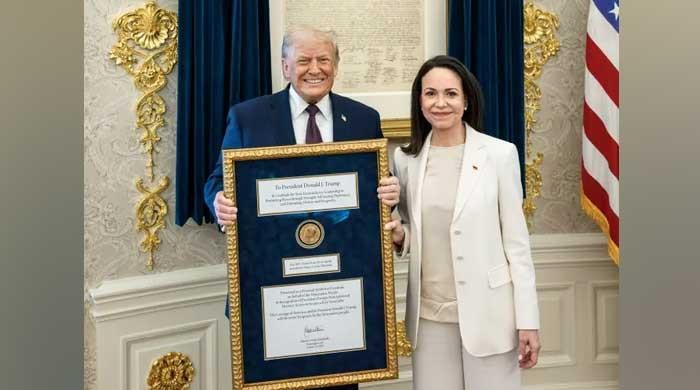
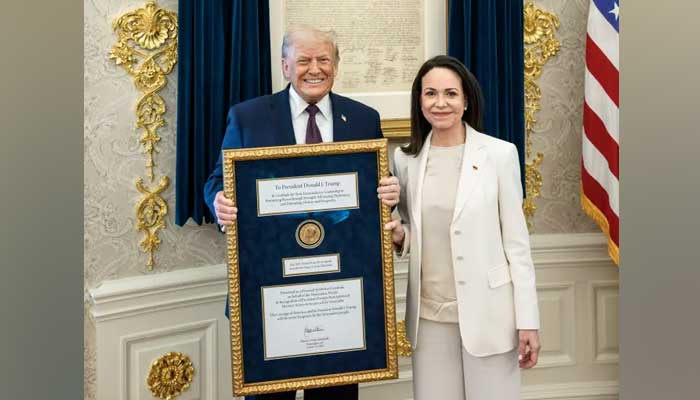
- Machado says meeting was ‘excellent,’ but did not elaborate.
- Encounter comes as Trump has praised Caracas’ interim leader.
- Trump has prioritised securing access to Venezuelan oil.
WASHINGTON: Venezuelan opposition leader Maria Corina Machado gave her Nobel Peace Prize medal to US President Donald Trump on Thursday during a White House meeting, as she tries to gain some influence over how the president shapes the South American country’s political future.
A White House official confirmed that Trump intends to keep the medal.
In a social media post on Thursday evening, Trump wrote: “Maria presented me with her Nobel Peace Prize for the work I have done. Such a wonderful gesture of mutual respect. Thank you Maria!”
Machado, who described the meeting as “excellent,” said the gift was in recognition of what she called his commitment to the freedom of the Venezuelan people.
Machado’s attempt to sway Trump came after he dismissed the idea of installing her as Venezuela’s leader to replace the deposed Nicolas Maduro. Trump openly campaigned for the prize before Machado was awarded it last month and complained bitterly when he was snubbed.
Though Machado gave Trump the gold medal that honorees receive with the prize, the honor remains hers; the Norwegian Nobel Institute has said the prize cannot be transferred, shared or revoked.
Asked on Wednesday if he wanted Machado to give him the prize, Trump told Reuters: “No, I didn’t say that. She won the Nobel Peace Prize.”
The Republican president long expressed interest in winning the prize and has at times linked it to diplomatic achievements.
The lunch meeting, which appeared to last slightly over an hour, marked the first time the two have met in person. Machado then met with more than a dozen senators, both Republican and Democratic, on Capitol Hill, where she has generally found more enthusiastic allies.
While the visit was ongoing, White House press secretary Karoline Leavitt said Trump had been looking forward to meeting Machado, but that he stood by his “realistic” assessment that she did not currently have the support needed to lead the country in the short term.
Machado, who fled Venezuela in a daring seaborne escape in December, is competing for Trump’s ear with members of Venezuela’s government and seeking to ensure she has a role in governing the nation going forward.
After the US captured Maduro in a snatch-and-grab operation this month, various opposition figures, members of Venezuela’s diaspora and politicians throughout the US and Latin America have expressed hope that Venezuela will begin the process of democratisation.
Politics
Trump threatens military action over Minnesota protests
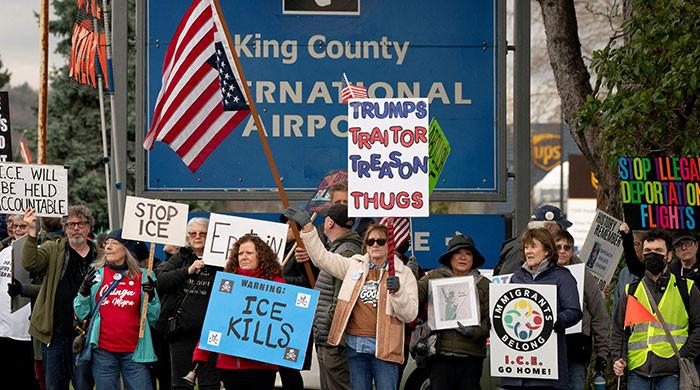
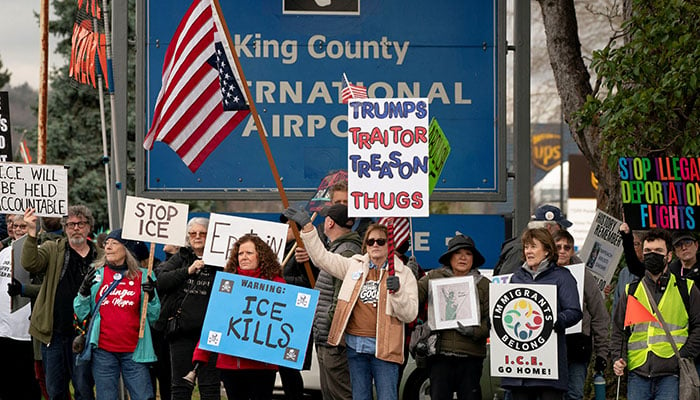
- Trump issues threat after ICE officer shot Venezuelan man.
- Says he may deploy military force in Minnesota.
- Minnesota leaders say ICE actions are ‘disgusting and intolerable.
WASHINGTON: US President Donald Trump threatened on Thursday to invoke the Insurrection Act to deploy military forces in Minnesota after days of angry protests over a surge in immigration agents on the streets of Minneapolis.
Confrontations between residents and federal officers have become increasingly tense after an Immigration and Customs Enforcement agent fatally shot a US citizen, Renee Good, in a car eight days ago in Minneapolis, and the protests have spread to other cities. Trump’s latest threat came a few hours after an immigration officer shot a Venezuelan man who the government said was fleeing after agents tried to stop his vehicle in Minneapolis. The man was wounded in the leg.
“If the corrupt politicians of Minnesota don’t obey the law and stop the professional agitators and insurrectionists from attacking the Patriots of ICE, who are only trying to do their job, I will institute the INSURRECTION ACT,” Trump wrote on social media.
Trump, a Republican, has for weeks derided the state’s Democratic leaders and called people of Somali origin there “garbage” who should be “thrown out” of the country.
He has already sent nearly 3,000 federal officers into the Minneapolis area, who have carried guns through the city’s icy streets, wearing military-style camouflage gear and masks that hide their faces.
They have been met day and night by loud, often angry protests by residents, some blowing whistles or banging tambourines. On Wednesday night, crowds of nearby residents gathered near the area where the Venezuelan man was shot. Some shouted in protest, and federal officers ignited flash-bang grenades and released clouds of tear gas.
Later, after most of the residents had been dispersed, a small group vandalised a car they believed belonged to the federal officers, one person daubing it with red graffiti saying: “Hang Kristi Noem,” in reference to the Homeland Security secretary who oversees ICE.
Since the surge began, agents have arrested both immigrants and protesters, at times smashing windows and pulling people from their cars, and have been shouted at for stopping Black and Latino US citizens to demand identification.
‘Disgusting and intolerable’
The US Department of Homeland Security, which is overseeing Trump’s immigration crackdown, identified the man its officer shot as Julio Cesar Sosa-Celis. He had been allowed into the US by the administration of Trump’s predecessor, Joe Biden, in 2022 through the government’s humanitarian parole programme. The Trump administration has since revoked the parole granted to Venezuelans and others admitted under Biden.
In its statement, DHS called him a convicted criminal under Minnesota law after being caught driving without a licence and giving a false name to a police officer. Court records of those cases reviewed by Reuters show he was only convicted of “petty misdemeanours”, which Minnesota state law says do “not constitute a crime”, and for which the maximum punishment is a $300 fine.
According to the DHS account, federal officers tried to stop Sosa-Celis in his vehicle. He fled the scene in his vehicle, crashed into a parked car, and then ran away on foot, the DHS said.
One officer caught him and while the two were “in a struggle on the ground”, two other Venezuelan men came out of a nearby apartment and “attacked the law enforcement officer with a snow shovel and broom handle”, the statement said.
Sosa-Celis got loose and began hitting the officer with “a shovel or a broomstick”, and so the officer “fired defensive shots to defend his life”, the DHS statement said.
Reuters was not able to verify the account given by DHS. The men fled into the apartment and all three were arrested after officers went in, DHS said. Sosa-Celis and the officer were recovering in hospital from injuries, according to the department and city officials.
The Trump administration and Minnesota leaders have each blamed the other for stoking anger and violence.
In a late-night press conference, Mayor Jacob Frey called the ICE surge an invasion and said he had seen “conduct from ICE that is disgusting and is intolerable”.
“We cannot be at a place right now in America where we have two governmental entities that are literally fighting one another,” Frey said, calling for peace.
Trump supporters divided over immigration enforcement
The Insurrection Act of 1807 is a law allowing the president to deploy the military or federalise soldiers in a state’s National Guard to quell rebellion, an exception to laws that prohibit soldiers being used in civil or criminal law enforcement.
It has been used 30 times in US history, according to New York University’s Brennan Centre for Justice. The Supreme Court has ruled that the president alone can determine if the act’s conditions have been met.
Trump has already taken the unusual step of federalising National Guard soldiers to help with immigration law enforcement in Democrat-run cities over the objections of state governors, including in Los Angeles last year, which a judge ruled in December was unconstitutional.
Trump’s aggressive moves in Minnesota have divided his supporters: 59% of Republicans favoured a policy prioritising arrests by immigration officers even if people get hurt, while 39% said officers should focus on not harming people even if it means fewer arrests, according to a Reuters/Ipsos survey released on Thursday.
If Trump sends soldiers to Minnesota, he would almost certainly face legal challenges by the state. The Minnesota attorney general’s office has already sued the Trump administration this week, saying ICE agents were engaged in a “pattern of unlawful, violent conduct”, including racial profiling and forced entry into residents’ homes without warrants. The American Civil Liberties Union also filed a similar lawsuit against the Trump administration on Thursday.
At a brief hearing on Wednesday, Minnesota asked US District Judge Kate Menendez to issue a temporary order restraining the ICE surge.
Menendez ordered the Trump administration to respond by Monday, saying she would rule after that, calling the issues raised by Minnesota’s lawsuit “enormously important”.
Politics
US imposes sanctions on Iran over ‘crackdown’ on protesters
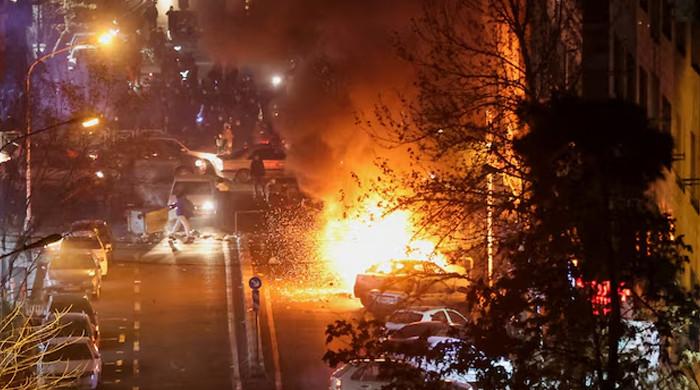
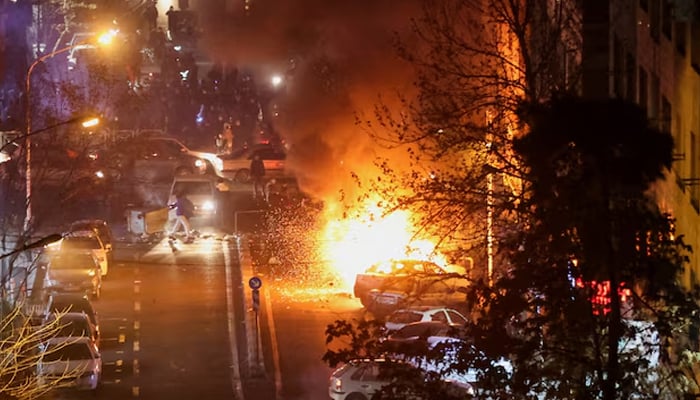
- Treasury dept accuses forces of being architects of crackdown.
- US says tracking Iranian leaders’ funds being wired to banks.
- Trump questions Reza Pahlavi’s ability garner support in Iran.
The United States on Thursday imposed sanctions on five Iranian officials it accused of being behind the crackdown on protests and warned it was tracking Iranian leaders’ funds being wired to banks around the world, as US President Donald Trump’s administration increases pressure on Tehran.
The US Treasury Department, in a statement, said it imposed sanctions on the Secretary of the Supreme Council for National Security as well as Islamic Revolutionary Guard Corps and law enforcement forces commanders, accusing them of being architects of the crackdown.
Treasury Secretary Scott Bessent, in a video on Thursday, said Washington’s message to Iran’s leaders was clear: “US Treasury knows, that like rats on a sinking ship, you are frantically wiring funds stolen from Iranian families to banks and financial institutions around the world. Rest assured, we will track them and you.”
“But there’s still time, if you choose to join us. As President Trump has said, stop the violence and stand with the people of Iran.”
The unrest in Iran started with protests over soaring prices before turning into one of the biggest challenges to the establishment since the 1979 Islamic Revolution.
Trump has repeatedly threatened to intervene on behalf of protesters in Iran, where the establishment has cracked down hard on nationwide unrest since December 28.
“The United States stands firmly behind the Iranian people in their call for freedom and justice,” Bessent said in the statement. “Treasury will use every tool to target those behind the regime’s tyrannical oppression of human rights.”
The Treasury also imposed sanctions on 18 people it accused of involvement in laundering the proceeds of Iranian petroleum and petrochemical sales to foreign markets as part of “shadow banking” networks of sanctioned Iranian financial institutions.
Thursday’s action is the latest move targeting Tehran since Trump restored his “maximum pressure” campaign on Iran, which includes efforts to drive its oil exports to zero and help prevent Tehran from developing a nuclear weapon.
Trump questions Pahlavi’s ability to lead Iran
Separately, Trump — in an exclusive Reuters interview in the Oval Office — said that Iranian opposition figure Reza Pahlavi “seems very nice” but expressed uncertainty over whether Pahlavi would be able to muster support within Iran to eventually take over.
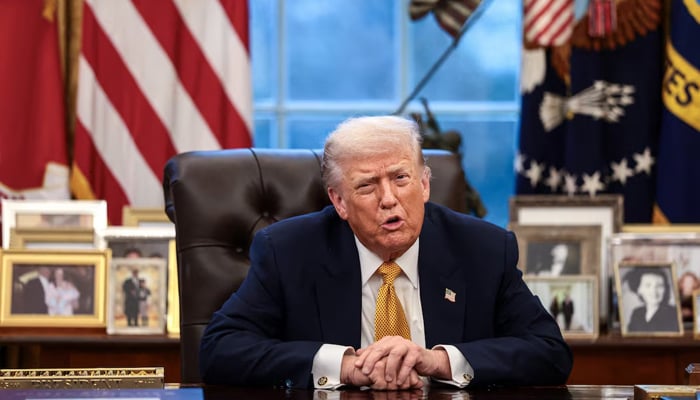
“He seems very nice, but I don’t know how he’d play within his own country,” Trump said. “And we really aren’t up to that point yet.
“I don’t know whether or not his country would accept his leadership, and certainly if they would, that would be fine with me.”
Trump’s comments went further in questioning Pahlavi’s ability to lead Iran, after he said last week that he had no plans to meet with him.
The US-based Pahlavi, 65, has lived outside Iran since before his father was toppled in the 1979 Islamic Revolution and has become a prominent voice in the protests.
Echoing Trump’s caution, Sanam Vakil, deputy director of Chatham House’s Middle East and North Africa Program, said Pahlavi had gained prominence among some protesters and had helped mobilise them to some extent. “But I wouldn’t overstate it. It’s very hard to see how much support he has or how much support any figure has in Iran,” she said.
Trump said it is possible the government in Tehran could fall due to the protests but that in truth “any regime can fail.”
“Whether or not it falls or not, it’s going to be an interesting period of time,” he said.
-

 Politics1 week ago
Politics1 week agoUK says provided assistance in US-led tanker seizure
-

 Entertainment1 week ago
Entertainment1 week agoDoes new US food pyramid put too much steak on your plate?
-

 Entertainment1 week ago
Entertainment1 week agoWhy did Nick Reiner’s lawyer Alan Jackson withdraw from case?
-

 Sports5 days ago
Sports5 days agoClock is ticking for Frank at Spurs, with dwindling evidence he deserves extra time
-

 Business1 week ago
Business1 week agoTrump moves to ban home purchases by institutional investors
-

 Sports1 week ago
Sports1 week agoPGA of America CEO steps down after one year to take care of mother and mother-in-law
-

 Tech3 days ago
Tech3 days agoNew Proposed Legislation Would Let Self-Driving Cars Operate in New York State
-

 Business1 week ago
Business1 week agoBulls dominate as KSE-100 breaks past 186,000 mark – SUCH TV






